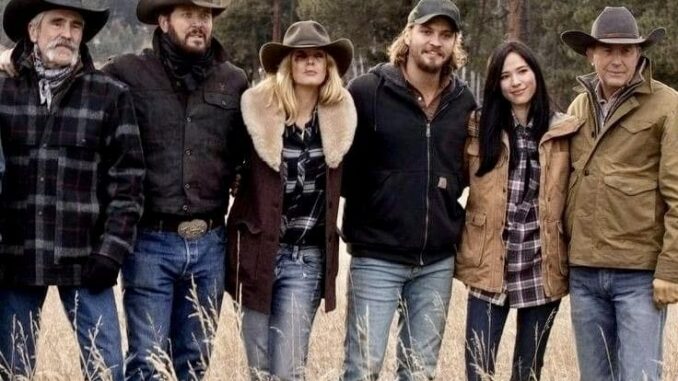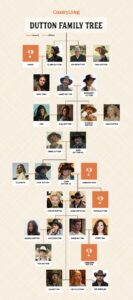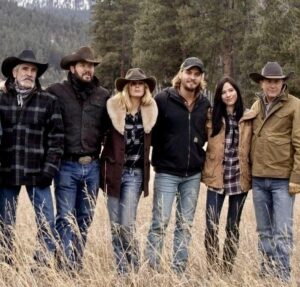
The Legacy of the Dutton Family
Yellowstone has captivated audiences with its gripping portrayal of the Dutton family’s struggle to protect their Montana ranch. At the heart of this intense drama lies a rich family history spanning seven generations. Understanding this lineage not only deepens our appreciation of the characters but also highlights the enduring themes of power, legacy, and resilience that define the series.
1. The Founding Generation: John Dutton Sr.
John Dutton Sr.: The Patriarch
The story begins with John Dutton Sr., the original founder of the Dutton Ranch. A visionary and steadfast leader, he established the ranch in the late 19th century, laying the groundwork for what would become one of the largest and most influential ranches in Montana.
Establishing the Ranch
John Sr.’s relentless work ethic and dedication to the land ensured the ranch’s prosperity. His ability to navigate the challenges of frontier life set a strong example for future generations, emphasizing the importance of perseverance and integrity.
Legacy of Leadership
John Sr.’s leadership style, marked by decisiveness and compassion, became the cornerstone of the Dutton family’s values. His influence is felt throughout the generations, shaping how each descendant approaches leadership and conflict.
2. The Second Generation: William Dutton
William Dutton: The Heir Apparent
William Dutton, son of John Sr., inherited the ranch in the early 20th century. Under his stewardship, the ranch expanded its operations, embracing modern agricultural techniques while maintaining traditional practices.
Expanding the Empire
William’s strategic investments in cattle and land acquisitions significantly increased the ranch’s holdings. His vision for growth positioned the Duttons as key players in Montana’s agricultural sector.
Balancing Tradition and Innovation
William adeptly balanced respect for the ranch’s legacy with the need for innovation. His ability to adapt to changing times ensured the ranch’s continued success and resilience in the face of economic fluctuations.
3. The Third Generation: Charles Dutton
Charles Dutton: The Innovator
Charles Dutton, William’s son, brought a new era of modernization to the ranch in the mid-20th century. His forward-thinking approach introduced advanced technologies and diversified the ranch’s operations.
Technological Advancements
Under Charles’s leadership, the Dutton Ranch adopted mechanized farming equipment and implemented sustainable farming practices. These innovations boosted productivity and environmental stewardship.
Diversification of Interests
Charles expanded the family’s business interests beyond cattle ranching, investing in timber and real estate. This diversification safeguarded the ranch’s financial stability and opened new revenue streams.
4. The Fourth Generation: Robert Dutton
Robert Dutton: The Strategist
Robert Dutton, son of Charles, took the reins during the late 20th century. His strategic acumen and ability to navigate complex business landscapes ensured the ranch’s dominance in the region.
Strategic Partnerships
Robert forged alliances with local businesses and government entities, securing favorable terms for land use and resource management. These partnerships reinforced the Duttons’ influence and protected their interests.
Navigating Challenges
Facing economic downturns and environmental challenges, Robert’s leadership was pivotal in steering the ranch through turbulent times. His resilience and problem-solving skills maintained the ranch’s prosperity.
5. The Fifth Generation: Michael Dutton
Michael Dutton: The Visionary
Michael Dutton, Robert’s son, inherited a robust and diversified ranching empire. His innovative mindset and commitment to sustainability positioned the Duttons as leaders in eco-friendly ranching practices.
Sustainable Practices
Michael implemented renewable energy sources and organic farming techniques, reducing the ranch’s environmental footprint. His dedication to sustainability earned the Duttons recognition as pioneers in green ranching.
Community Engagement
Michael prioritized community involvement, supporting local initiatives and fostering strong relationships with neighboring communities. His efforts strengthened the Duttons’ reputation as responsible and benevolent landowners.
6. The Sixth Generation: Emily Dutton

Emily Dutton: The Modern Leader
Emily Dutton, daughter of Michael, represents the newest generation of Dutton leadership. Her blend of traditional values and contemporary strategies ensures the ranch remains relevant in the 21st century.
Digital Transformation
Emily spearheaded the adoption of digital technologies, integrating data analytics and automation into ranch operations. These advancements enhanced efficiency and data-driven decision-making.
Expanding Horizons
Under Emily’s guidance, the ranch explored new markets, including agritourism and specialty products. Her entrepreneurial spirit opened avenues for growth and diversification.
7. The Seventh Generation: Noah Dutton
Noah Dutton: The Future of the Ranch
Noah Dutton, Emily’s son, embodies the future of the Dutton legacy. As a young and dynamic leader, he is poised to navigate the ranch through modern challenges and opportunities.
Innovative Ventures
Noah is keen on exploring cutting-edge agricultural technologies, such as vertical farming and precision livestock management. His forward-thinking approach aims to position the Dutton Ranch at the forefront of agricultural innovation.
Global Outreach
Noah envisions expanding the ranch’s presence globally, establishing partnerships and exporting high-quality products to international markets. His ambition seeks to elevate the Duttons’ status on the world stage.
Understanding the Complex Relationships
Intergenerational Bonds
The Dutton family tree is characterized by strong intergenerational bonds. Each generation builds upon the foundations laid by their predecessors, creating a cohesive and resilient family unit.
Marriages and Alliances
Strategic marriages and alliances have played a significant role in expanding the Duttons’ influence. These unions have brought in new perspectives and resources, further strengthening the family’s legacy.
Mentorship and Guidance
Elders in the family, such as John Sr. and William, have been pivotal in mentoring the younger generations. Their wisdom and experience provide invaluable guidance, ensuring the family’s values and vision are upheld.
The Role of Extended Family Members

Aunt Clara Dutton
Clara Dutton, Robert’s sister, managed the ranch’s agricultural operations during challenging times. Her expertise in crop management contributed significantly to the ranch’s diversification efforts.
Uncle Samuel Dutton
Samuel Dutton, Charles’s brother, oversaw the ranch’s timber business. His stewardship expanded the family’s interests beyond cattle, adding a vital revenue stream.
Cousins and Their Contributions
Cousins within the Dutton family have taken on various roles, from managing real estate investments to leading community outreach programs. Their contributions ensure the ranch remains dynamic and adaptable.
Key Events Shaping the Family Tree
The Great Expansion Era
During William’s leadership, the ranch underwent significant expansion, acquiring vast tracts of land and increasing cattle herds. This era established the ranch’s dominance in Montana.
Technological Revolution
Charles’s introduction of modern technologies revolutionized ranch operations, enhancing efficiency and productivity. This period marked a shift towards sustainable and diversified farming practices.
Economic Downturns and Resilience
Robert’s tenure saw the ranch weathering economic downturns, thanks to strategic partnerships and diversification. These challenges tested the family’s resilience and adaptability.
The Influence of External Factors
Environmental Changes
Climate variations and environmental policies have impacted ranching practices. Each generation has adapted to these changes, implementing sustainable practices to mitigate adverse effects.
Economic Shifts
Global economic shifts have influenced market demand and resource availability. The Duttons’ diversified portfolio has enabled them to navigate these fluctuations effectively.
Social and Cultural Dynamics
Changing social and cultural landscapes have shaped community relations and business practices. The family’s commitment to community engagement has fostered strong local support.
The Dutton Family’s Impact on ‘Yellowstone’
Driving the Narrative
The intricate relationships and legacy of the Dutton family drive much of the narrative in Yellowstone. Family dynamics, power struggles, and legacy battles create compelling storylines that keep viewers hooked.
Character Development
Understanding the family tree enhances character development, revealing motivations and historical context. It adds depth to each character’s actions and decisions, making their journeys more relatable and impactful.
Themes of Legacy and Power
The Dutton family tree embodies themes of legacy and power, exploring how generations strive to maintain and expand their influence. These themes resonate with audiences, reflecting universal struggles and aspirations.
Visualizing the Dutton Family Tree
Ancestral Roots
At the base of the family tree lies John Dutton Sr., whose legacy sets the stage for future generations. His descendants branch out, each adding their unique contributions and challenges.
Generational Branches
Each generation represents a branch that diverges yet remains connected, illustrating the evolution of the family business and values over time.
Future Projections
The seventh generation, led by Noah Dutton, signifies the family’s future, highlighting the ongoing legacy and the potential for new directions and innovations.
Comparing the Dutton Generations
Leadership Styles
From John Sr.’s stoic leadership to Noah’s innovative approach, each generation exhibits distinct leadership styles that reflect their times and personal philosophies.
Business Strategies
The family’s business strategies have evolved, adapting to technological advancements and market demands. This evolution showcases their ability to stay relevant and prosperous.
Family Dynamics
Interpersonal relationships within the family have shifted, influenced by marriages, alliances, and individual ambitions. These dynamics add layers of complexity to the family tree.
Challenges Across Generations
Succession Planning
Ensuring smooth succession has been a recurring challenge. Each generation has faced the task of passing the torch while maintaining the ranch’s integrity and legacy.
Conflict Resolution
Internal conflicts and external threats have tested the family’s unity. Their ability to resolve disputes and collaborate has been crucial in overcoming obstacles.
Balancing Tradition and Change
Maintaining traditional values while embracing change has been a delicate balance. The Duttons have navigated this tension, preserving their heritage while adapting to modern demands.
The Importance of Heritage and Identity
Preserving Traditions
Each generation has upheld and adapted family traditions, ensuring that the ranch’s cultural heritage remains intact while allowing for growth and modernization.
Sense of Identity
The Dutton family’s strong sense of identity fosters unity and purpose. Their commitment to the ranch and each other defines their collective and individual paths.
Cultural Influence
The family’s influence extends beyond the ranch, impacting the broader Montana community and contributing to regional cultural narratives.
The Dutton Family Tree: A Symbol of Resilience
Overcoming Adversity
The Duttons’ ability to overcome adversity highlights their resilience. Each generation has faced and surmounted challenges, reinforcing the family’s strength and determination.
Adaptation and Innovation
Adapting to changing circumstances and embracing innovation has been key to the family’s enduring success. Their proactive approach ensures they remain leaders in their field.
Enduring Legacy
The Dutton family tree stands as a testament to enduring legacy, showcasing how each generation builds upon the last to create a lasting and influential presence.
Conclusion: The Enduring Legacy of the Dutton Family
The Dutton family tree is more than just a lineage; it’s a living testament to the power of legacy, resilience, and adaptability. Spanning seven generations, each branch of the family contributes to the rich tapestry of Yellowstone, driving the narrative forward with their unique stories and unwavering commitment to the ranch. As we delve into the relationships and histories that define the Duttons, we gain a deeper appreciation for the characters and the enduring themes that make Yellowstone a captivating saga of power, family, and legacy.
FAQs
1. How many generations of the Dutton family are depicted in ‘Yellowstone’?
The Dutton family tree in Yellowstone spans seven generations, showcasing the evolution and legacy of the family over time.
2. Who was the founder of the Dutton Ranch?
John Dutton Sr. is the founding patriarch who established the Dutton Ranch in the late 19th century, setting the foundation for the family’s legacy.
3. How has the leadership style evolved across the Dutton generations?
Each generation exhibits distinct leadership styles, from John Sr.’s stoic and decisive approach to Noah Dutton’s innovative and forward-thinking strategies.
4. What role do extended family members play in the Dutton family tree?
Extended family members, such as aunts, uncles, and cousins, contribute to various aspects of the ranch’s operations, adding depth and diversity to the family’s legacy.
5. How does the Dutton family tree influence the show’s narrative?
The intricate relationships and historical context of the Dutton family tree drive the narrative, creating compelling storylines centered around power struggles, legacy battles, and familial bonds.
